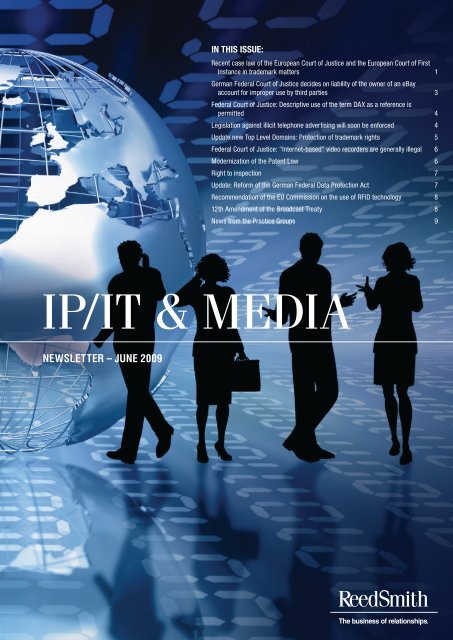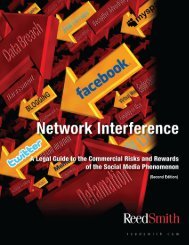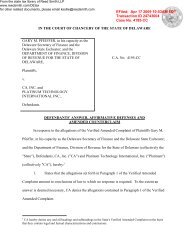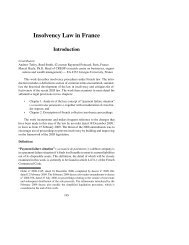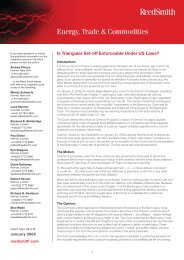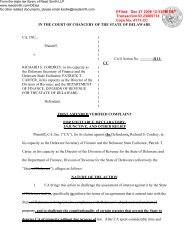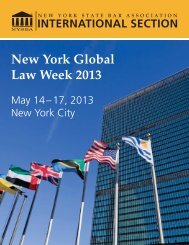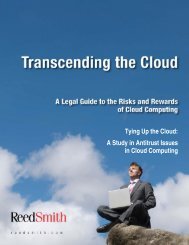IP/IT & MEDIA - Reed Smith
IP/IT & MEDIA - Reed Smith
IP/IT & MEDIA - Reed Smith
You also want an ePaper? Increase the reach of your titles
YUMPU automatically turns print PDFs into web optimized ePapers that Google loves.
IN THIS ISSUE:<br />
Recent case law of the European Court of Justice and the European Court of First<br />
Instance in trademark matters 1<br />
German Federal Court of Justice decides on liability of the owner of an eBay<br />
account for improper use by third parties 3<br />
Federal Court of Justice: Descriptive use of the term DAX as a reference is<br />
permitted 4<br />
Legislation against illicit telephone advertising will soon be enforced 4<br />
Update new Top Level Domains: Protection of trademark rights 5<br />
Federal Court of Justice: “Internet-based” video recorders are generally illegal 6<br />
Modernization of the Patent Law 6<br />
Right to inspection 7<br />
Update: Reform of the German Federal Data Protection Act 7<br />
Recommendation of the EU Commission on the use of RFID technology 8<br />
12th Amendment of the Broadcast Treaty 8<br />
News from the Practice Groups 9<br />
<strong>IP</strong>/<strong>IT</strong> & <strong>MEDIA</strong><br />
NEWSLETTER – JUNE 2009
<strong>IP</strong>/<strong>IT</strong> & MEDIa - JUNE 2009 1<br />
Recent case law of the European<br />
Court of Justice and the European<br />
Court of First Instance in trademark<br />
matters<br />
Dr. Alexander R. Klett / Valeria Mushchinina<br />
Three-dimensional trademarks<br />
On May 2, 2009, the European Court of First Instance had to decide on the<br />
registrability of three-dimensional trademarks in two cases.<br />
In the first case (T-449/07), the plaintiff had applied for a threedimensional<br />
CTM in the form of an arrangement of five separate sausages,<br />
the ends of which are linked. The application was, among others, for meat,<br />
poultry and game products and other food products. In principle, a product<br />
design as such can be protected by trademark law. In that regard, the<br />
criteria for assessing the distinctive character of three-dimensional marks<br />
consisting of the shape of a product are no different from those applicable<br />
to other trademark categories. However, average consumers will often<br />
not view mere product shapes as indicators of origin, and it is therefore<br />
often more difficult to establish distinctiveness in relation to such a three<br />
dimensional mark than in relation to a word or figurative mark.<br />
The court also denied the registrability of a trademark for perfumes in the<br />
shape of a cylindrical, elongated and transparent perfume spray bottle<br />
(T-104/08). The court stated that the more the shape applied for comes<br />
close to the shape in which the product most likely appears, the more<br />
likely it is that this shape lacks distinctive character. A “variation” of the<br />
common shape of a product type does not suffice for distinctiveness,<br />
according to the court. Although the court admitted that it is easier to<br />
prove the distinctive character of a perfume packaging in comparison with<br />
other three-dimensional trademarks, the same criteria for the assessment<br />
of distinctiveness are still to be applied. The court decided that the shape<br />
applied for, which is quite plain, is, taken as a whole, quite common and is<br />
often used especially for perfume tester bottles. The same, according to<br />
the court, applies to the combination of the parts of the shape.<br />
CTM application<br />
The court stated that sausages are widespread, everyday consumer<br />
goods in the European Union. Although the shape applied for differs from<br />
the classic shape of sausages, the average consumer will not perceive<br />
the shape applied for as an indication of the commercial origin of those<br />
goods. Though the shape applied for is similar to the shape of a pretzel,<br />
it is nevertheless the case that the average consumer will view the shape<br />
applied for merely as a collection of five sausages linked to one another.<br />
Also, the use of a novel form of presenting sausages as a particular<br />
marketing concept is a factor that cannot have any bearing on the<br />
assessment of the registrability of the mark. Therefore, according to the<br />
court, the shape applied for is devoid of distinctive character within the<br />
meaning of Article 7(1)(b) of the Community Trademark Regulation.<br />
CTM application<br />
Scope of protection of well-known<br />
trademarks according to the Community<br />
Trademark Regulation<br />
On March 12, 2009, the European Court of Justice decided a case<br />
concerning the scope of protection of well-known trademarks according<br />
to Article 8(5) of the Community Trademark Regulation (C-320/07 P). The<br />
NASDAQ Stock Market Inc., the owner of the earlier trademark “NASDAQ,”<br />
registered inter alia for financial services, opposed the application of<br />
a figurative trademark “Nasdaq” for sport equipment by Antartica Srl.<br />
pursuant to Article 8(5) of the Community Trademark Regulation (broader<br />
protection for well-known trademarks). The Court of First Instance as court<br />
of lower instance held that Antartica’s use of the figurative mark “nasdaq”<br />
without due cause would take unfair advantage of or be detrimental to<br />
the distinctive character and repute of the earlier mark. The trademark<br />
NASDAQ presents a certain image of modernity, which establishes the<br />
existence of a future risk that this reputation could be transferred to the<br />
goods of Antartica.
<strong>IP</strong>/<strong>IT</strong> & MEDIa - JUNE 2009 2<br />
CTM application<br />
Invoked earlier rights<br />
Antartica Srl. claimed that the consumers of the goods covered by the trademark<br />
applied for are not aware of the earlier mark and, therefore, that any unfair<br />
advantage can be ruled out in the current case. For purposes of Article 8(5) of the<br />
Community Trademark Regulation the “reputation” of the earlier mark, according<br />
to Antartica, had to extend to the general public and not only to the public<br />
constituted by the consumers of the goods designated by that trademark.<br />
The European Court of Justice agreed with the court of lower instance and<br />
stated that considering the omnipresence of the stock market NASDAQ in<br />
the press—not only in the specialist press but also in the general press—<br />
and the interest of a large part of the general public in the development of<br />
the financial markets, the reputation of the earlier mark reaches further<br />
than only to professional circles of the financial sphere.<br />
However, only a few weeks later, on April 30, 2009, the European Court of<br />
Justice decided in another case regarding Article 8(5) of the Community<br />
Trademark Regulation (C-136/08 P) that no likelihood of confusion exists between<br />
the earlier figurative trademark “Camel,” which was registered for tobacco goods<br />
and cigarettes, and the figurative trademark “Camelo,” registered for coffee.<br />
CTM application<br />
Though the court recognized the fact that the earlier trademark is wellknown<br />
and that the trademarks are similar, it could not determine that<br />
the further requirements of Article 8(5) of the Community Trademark<br />
Regulation were fulfilled. The court could not find that the trademark<br />
applied for would take unfair advantage of the distinctiveness or would<br />
damage the reputation of the earlier trademark.<br />
Consequences of a breach of a trademark<br />
license agreement<br />
In the judgment of the European Court of Justice dated April 23, 2009<br />
(C-59/08), the following facts were at issue: Christian Dior couture SA<br />
concluded a trademark license agreement with Société industrielle lingerie<br />
(SIL) in respect of the manufacture and distribution of luxury corsetry<br />
goods bearing the Christian Dior trademark, which is owned by Dior.<br />
According to the agreement, in order to maintain the repute and prestige of<br />
the trademark, SIL was obliged not to sell the goods outside the selective<br />
distribution network. In breach of its contractual obligations, SIL sold<br />
goods bearing the Christian Dior trademark to Copad, a company operating<br />
a discount store business. Therefore, Dior brought an action against SIL<br />
and Copad for trademark infringement. Within this action, the French Cour<br />
de cassation decided to refer three questions to the European Court of<br />
Justice for a preliminary ruling.<br />
The court answered the question of whether a provision in the license<br />
agreement prohibiting sales to discount stores on grounds of the<br />
trademark’s prestige falls under Article 8(2) of the Directive 89/104/EEC<br />
(Trademarks Directive) in the affirmative, provided it has been established<br />
that contravention, by reason of the situation in the main proceedings,<br />
damages the allure and prestigious image that bestows on the respective<br />
products an aura of luxury.<br />
Article 8(2) of the Trademarks Directive contains the following wording:<br />
“The proprietor of a trademark may invoke the rights conferred by that<br />
trademark against a licensee who contravenes any provision in his licensing<br />
contract with regard to its duration, the form covered by the registration in<br />
which the trademark may be used, the scope of the goods or services for<br />
which the license is granted, the territory in which the trademark may be<br />
affixed, or the quality of the goods manufactured or of the services provided<br />
by the licensee.”<br />
Invoked earlier rights<br />
The court pointed out that it is precisely where the licensee contravenes<br />
provisions in the license agreement concerning, in particular, the quality<br />
of the goods manufactured, that Article 8(2) of the Directive enables the<br />
proprietor of the trademark to invoke the rights that the directive grants<br />
him. The quality of luxury goods is also based on the allure and prestigious<br />
image that bestows on them an aura of luxury. Therefore, an impairment<br />
to that aura of luxury is likely to affect the actual quality of those goods. It<br />
is not impossible that the sale by the licensee of luxury goods to discount<br />
stores that are not part of the selective distribution network set up under
<strong>IP</strong>/<strong>IT</strong> & MEDIa - JUNE 2009 3<br />
the license agreement may constitute such impairment. The court stated<br />
that it is for the national court to examine whether contravention by the<br />
licensee had damaged the aura of luxury of the goods. In this respect, the<br />
nature of the luxury goods bearing the trademark, as well as the volumes<br />
sold, had to be taken into account, along with the question of whether the<br />
licensee sells the goods to discount stores that are not part of the selective<br />
distribution network regularly or only occasionally, and what the nature of<br />
the goods normally marketed by those discount stores—and the marketing<br />
methods normally used in that sector of activity - are.<br />
The second question concerned the circumstances under which the<br />
trademark owner cannot claim his right to prohibit the use of a trademark<br />
because his rights are exhausted. According to Article 7(1) of the Directive,<br />
exhaustion occurs in relation to goods that have been put on the market in<br />
the Community under the trademark by the proprietor or with his consent.<br />
The European Court of Justice decided that in cases in which a licensee<br />
puts goods bearing a trademark on the market in disregard of a provision<br />
in a license agreement, he does so without the consent of the proprietor of<br />
the trademark if it is established that the provision in question is included<br />
in those exhaustively listed in Article 8(2) of the Directive.<br />
With its third question, the Cour de cassation asked whether the proprietor<br />
of a trademark can nevertheless oppose further commercialization of<br />
the goods if the fact that a licensee puts luxury goods on the market<br />
in contravention of a clause in a license agreement is deemed to result<br />
in exhaustion of rights. According to Article 7(1) of the Directive, the<br />
proprietor can oppose further commercialization of the goods in specific<br />
cases, especially where the condition of the goods is changed or impaired<br />
after they have been put on the market. The question was whether the<br />
proprietor of a trademark could rely on a clause in a license agreement that<br />
the licensee had violated, in order to support this argument.<br />
The court answered as follows: Where a licensee sells goods to a discount<br />
store in contravention of a provision in the license agreement, a balance<br />
must be struck. On the one hand, the legitimate interest of the proprietor of<br />
the trademark covered by the license agreement in being protected against<br />
a discount store that does not form part of the selective distribution network<br />
using that trademark for commercial purposes in a manner that could<br />
damage the reputation of that trademark needs to be considered. On the<br />
other hand, the discount store’s legitimate interest in being able to resell the<br />
goods in question by using methods that are customary in its sector of trade<br />
has to be taken into account. Therefore, should the national court find that<br />
sale by the licensee to a third party is unlikely to undermine the quality of the<br />
luxury goods bearing the trademark, so that it must be considered that they<br />
were put on the market with the consent of the proprietor of the trademark,<br />
it will be for that court to assess, whether further commercialization of the<br />
luxury goods damages the reputation of that trademark. In this respect, it is<br />
necessary to take into consideration, in particular, the parties to whom the<br />
goods are resold, and the specific circumstances in which the luxury goods<br />
are put on the market.<br />
German Federal Court of Justice<br />
decides on liability of the owner<br />
of an eBay account for improper<br />
use by third parties<br />
Dr. Alexander R. Klett<br />
In its decision of March 11, 2009 (I ZR 114/06), the German Federal<br />
Court of Justice had to decide the question of whether the owner of<br />
an account at eBay is legally liable if a third party uses such account<br />
for copyright, trademark or unfair competition law infringements<br />
without the owner’s knowledge. The defendant, the owner of the<br />
account, defended himself by saying that his wife had used the<br />
account without his knowledge to sell personal items. Among these<br />
items was a necklace offered by the wife of the defendant that<br />
was described as being “Cartier style.” Cartier brought claims for<br />
trademark infringement, copyright infringement and infringement of<br />
unfair competition law.<br />
The civil court, as well as the Frankfurt Court of Appeals, dismissed<br />
the claims. The German Federal Court of Justice reversed the<br />
decision by the Court of Appeals and remanded the matter. Unlike the<br />
Frankfurt Court of Appeals, the Federal Court of Justice took the view<br />
that the defendant as the owner of the eBay account was liable for<br />
copyright or trademark infringement, and for unfair competition law<br />
infringement, if he did not take adequate measures to make sure that<br />
his wife did not have access to the user name and password of the<br />
eBay account. The legal argument made by the Court to support this<br />
is the violation by the owner of the account of the duty to store the<br />
access information safely.<br />
For trademark and copyright owners, this decision is positive. It<br />
brings legal certainty with respect to the question that was debated<br />
both among courts and scholars of whether the owner of an online<br />
account is liable for improper use by third parties if the access<br />
information is not stored safely. After this decision by the Federal<br />
Court of Justice, the dismissal of the claims will likely not be upheld<br />
by the Frankfurt Court of Appeals once the matter has been heard<br />
there once more.
<strong>IP</strong>/<strong>IT</strong> & MEDIa - JUNE 2009 4<br />
Federal Court of Justice:<br />
Descriptive use of the term DAX<br />
as a reference is permitted<br />
Valeria Mushchinina<br />
On April 30, 2009, the German Federal Court of Justice ruled that<br />
Deutsche Börse AG, the operator of the Frankfurt Stock Exchange, cannot<br />
forbid banks to use the term “DAX” (I ZR 42/07). The abbreviation DAX<br />
(Deutscher Aktienindex) stands for the German stock market index.<br />
The bank Commerzbank, which issues stock purchase warrants linked<br />
to the rate of the DAX, entered into a trademark license agreement with<br />
Deutsche Börse as the owner of the trademark “DAX.” After the agreement<br />
was terminated, the parties could not agree whether Commerzbank could<br />
continue to use the term DAX as a reference for its financial products.<br />
The German Federal Court of Justice decided that Commerzbank is<br />
allowed to use the term DAX both according to trademark law and unfair<br />
competition law as a descriptive indication for its own products. The<br />
German stock market index DAX represents the most important stocks of<br />
the German financial market. By referring to the index, Commerzbank does<br />
not take unfair advantage of the repute of the trademark DAX, because the<br />
valuation of the financial products is based primarily on the evaluation of<br />
the most important German stock corporations and the developments of<br />
the stock values, as well as on the terms and conditions for each security<br />
and the creditworthiness of the bank that issues the financial products.<br />
With this law, consumers should be better protected than before against<br />
unwanted telephone advertising. While advertising by telephone to<br />
consumers without permission has been unfair competition according to<br />
Sec. 7 subs. 2 no. 2 of the Act Against Unfair Competition, this will now be<br />
the case already if there is no “prior express” consent by the respective<br />
consumer. What is more, a new Sec. 20 will be introduced in the Act<br />
Against Unfair Competition, according to which a violation will carry a<br />
fine of up to €50,000 that may be imposed by the Federal Authority of<br />
Telecommunications and Transportation Networks.<br />
Furthermore, the law contains amendments to the Telecommunications<br />
Act, according to which call centers may no longer call without caller<br />
identification. If they do, they will risk a fine of up to €10,000.<br />
Legislation against illicit telephone<br />
advertising will soon be enforced<br />
Dr. Alexander R. Klett<br />
The law against illicit telephone advertising and for improving consumer<br />
protection with respect to specific modes of distribution, which was<br />
passed by the federal government in July 2008, was approved by the<br />
Lower House of the Federal Parliament in March and by the Upper House<br />
on May 15, 2009. Once the law has been published in the Federal Gazette,<br />
it will soon enter into force.<br />
In addition, the law provides for changes to the German Civil Code<br />
concerning distance contracts. In the future, consumers will have a<br />
revocation right also for newspaper and magazine subscription agreements<br />
concluded by telephone, as well as for betting and lottery agreements<br />
concluded by telephone. Finally, the inducement to change providers by<br />
telephone will be made more difficult. The new Sec. 312f of the Civil Code<br />
will provide that termination of the existing agreement upon conclusion of a<br />
new agreement with a new provider will require written form.<br />
From a consumer’s perspective, this law is positive. Doing business will<br />
become more difficult for call centers. It remains to be seen how efficiently<br />
the authorities will apply the new provisions and impose fines. In the<br />
past, infringements of Sec. 7 of the Act Against Unfair Competition often<br />
remained without consequences.
<strong>IP</strong>/<strong>IT</strong> & MEDIa - JUNE 2009 5<br />
Update new Top Level Domains:<br />
Protection of trademark rights<br />
Katharina A. Weimer<br />
Preceding the final decision of the Internet administration Internet<br />
Corporation for Assigned Names and Numbers (ICANN) on the allocation<br />
rules of the new Internet root zones, a team of trademark experts<br />
(the Implementation Recommendation Team, or IRT) has issued a list<br />
of recommendations.<br />
<strong>IP</strong> Clearinghouse<br />
The recommendation includes the formation of an <strong>IP</strong> Clearinghouse that<br />
shall be managed by a neutral third party. Holders of rights of diverse<br />
nature, whether registrable or not, may register their rights with this <strong>IP</strong><br />
Clearinghouse for a certain fee. The rights will be verified upon registration<br />
and afterwards annually. The data collected herein shall be used to<br />
support various other protection mechanisms recommended by the IRT.<br />
The recommendations include the “Globally Protected Marks List” (GPML),<br />
a watch notice procedure, a swift take-down procedure and detailed<br />
information in the domain owner databases of Whois (“Whois” is the<br />
colloquial name for the databases of the domain registries that contain<br />
the data to be made publicly available).<br />
Globally Protected Marks List<br />
The GPML is likely to become the most significant tool. Trademark owners<br />
who wish to have their mark included in this list have to register it with<br />
the <strong>IP</strong> Clearinghouse as a first step. It shall be a requirement for inclusion<br />
in this list that the applicant owns at least 200 national registrations in at<br />
least 90 countries in all five ICANN regions. The registrations must date<br />
back to prior to November 1, 2008. In addition to other requirements, a<br />
Second Level Domain that is identical to the mark must be registered in<br />
at least 50 countries. It shall not be a requirement that the owner applies<br />
(or has applied) for a new Top Level Domain (TLD) that corresponds to<br />
the mark. It is intended that registered marks shall enjoy a significantly<br />
heightened level of protection compared with the protection awarded to<br />
non-registered marks, such as, for instance, an automatic comparison<br />
of applied-for new TLDs with this list and refusal of registration of the<br />
applied-for TLDs in case of identicalness.<br />
Take-down procedure<br />
In addition to these preventive measures, a swift take-down procedure<br />
shall be implemented, the Uniform Rapid Suspension System. The system<br />
shall apply to obvious trademark infringements and abusive use of marks<br />
in domain names in connection with a website that also contains abusive<br />
use of a mark. If such obvious misuse or infringement is discovered,<br />
the respective domain will be blocked for the time of registration and<br />
afterwards will be dissolved, depending on the outcome of the procedure.<br />
The domain owner will be informed of the blocking and may provide a<br />
statement displaying his right or rightful interest in the use of the domain.<br />
During the subsequent proceeding, a similarity check will be undertaken<br />
and it will be examined whether the domain owner has a right or rightful<br />
interest in the domain and whether the domain is registered or used in<br />
bad faith. Depending on the outcome, the domain will be released or will<br />
remain blocked and will subsequently be deleted. This procedure shall be<br />
independent from the UDRP (Uniform Domain-Name Dispute-Resolution<br />
Policy) and potential judicial procedures.<br />
Practical use<br />
Owners of trademarks and other similar rights should closely follow the<br />
developments regarding the new Top Level Domains. The recommended<br />
measures contain protection mechanisms for rights holders that should<br />
be exhausted. Thereby, costs may be kept low and the value of a mark<br />
may be protected.<br />
Watch notice procedure<br />
The watch service shall enable every natural or legal person, against a<br />
fee, to receive a notification if TLDs are applied for that are identical to<br />
top level strings that the person has identified as to be watched. Such<br />
watch service shall also be called into existence for second level domains.<br />
Both procedures shall not hinder the actual registration but shall give the<br />
watching person the possibility to take actions if that becomes necessary.
<strong>IP</strong>/<strong>IT</strong> & MEDIa - JUNE 2009 6<br />
Federal Court of Justice:<br />
“Internet-based” video recorders<br />
are generally illegal<br />
DR. ALEXANDER R. KLETT / valeria Mushchinina<br />
The Federal Court of Justice had to decide on April 22, 2009 on the<br />
legitimacy of so-called “Internet-based” video recorders (I ZR 216/06).<br />
The court stated that the offering of Internet-based video recorders<br />
can violate the neighboring rights of broadcasting companies under the<br />
German Copyright Act and, therefore, is generally illegal.<br />
The plaintiff who broadcasts the television program “RTL” proceeded<br />
against the owner of the website “Shift.TV.” On this website, the defendant<br />
offers her customers the possibility to record programs of several<br />
television channels received via satellite antenna using an “Internet-based<br />
personal video recorder.” This technology allows programs to be saved on<br />
a “personal video recorder” in the storage space of the defendant’s server.<br />
Each recorder is assigned solely to the respective customer. The customer<br />
can retrieve the programs recorded on the personal video recorder from<br />
any place at any time, as often as required.<br />
The plaintiff as a broadcasting company claimed her neighboring<br />
rights according to Sec. 87 subs. 1 of the German Copyright Act<br />
(Urheberrechtsgesetz). The courts of the first and second instance<br />
decided to a large extent in favor of the plaintiff. The Federal Court of<br />
Justice annulled the judgment of the court of appeals and remanded the<br />
case to the lower court. The Federal Court of Justice did not see itself<br />
as being able to finally decide on the legitimacy of the personal video<br />
recorder because in terms of copyright law, it had not been sufficiently<br />
analyzed by the lower court as a matter of fact whether the defendant<br />
herself or her customers record the programs of the plaintiff on the<br />
personal video recorder.<br />
However, according to the Federal Court of Justice, copyright law is<br />
violated in both cases: In case the defendant records the programs on<br />
the personal video recorder on behalf of her customers, she violates Sec.<br />
87 subs. 1 of the German Copyright Act, which regulates the plaintiff’s<br />
right to record her program on picture and sound record media. Since<br />
the defendant does not offer her services for free, she cannot plead<br />
that her customers have a right to record programs for private use. In<br />
case the storage process proceeds fully automatically and the particular<br />
customer has to be deemed as the producer of the reproduction, the<br />
right to make a recording for private use applies. However, in this case,<br />
the defendant violates the plaintiff’s right to retransmit the broadcasts,<br />
because the defendant transmits the programs received via satellite<br />
antenna to the personal video recorder of her customer.<br />
It remains to be seen how the court of appeals will decide when the<br />
details about the recording process have been clarified.<br />
Modernization of the Patent Law<br />
Dr. Richard Schlötter<br />
On May 28, 2009, the Bundestag approved the Federal Government’s<br />
draft Act on the Simplification and Modernization of the Patent Law.<br />
The Modernizing Act focuses on the acceleration of patent revocation<br />
proceedings. Moreover, the Act provides for the simplification of<br />
proceedings with regard to employees’ inventions.<br />
Currently, the duration of revocation proceedings is very slow, which is<br />
mainly attributable to the duration of appeal proceedings at the Federal<br />
Supreme Court (currently often exceeding four years).<br />
Because in patent infringement proceedings the defendant cannot merely<br />
change the validity of the patent in suit, the defendant often has no other<br />
choice than to file nullity action against the patent in suit. If, in the opinion of<br />
the infringement court, there is a high likelihood that the patent is deemed<br />
invalid and will therefore hardly survive the nullity proceeding, it will suspend<br />
the infringement proceedings until the Federal Patent Court or the Federal<br />
Supreme Court has decided the validity. Considering the current duration<br />
of the proceedings for annulment, it may well be that the patent revocation<br />
proceedings will remain suspended by more than six years.<br />
The Patent Right Modernization Act is aimed at reducing the duration of<br />
actions for annulment of patents. In the future, the Federal Patent Court,<br />
acting as court of first instance in an action of nullity, shall draw the<br />
attention of the parties to questions that are material for the decision of the<br />
court, and that have not yet been addressed sufficiently in the parties in<br />
their written statements. In this manner, the parties will be able to focus on<br />
those details that are of particular importance in the opinion of the court.<br />
At the same time, the Federal Patent Court shall have the possibility to<br />
impose binding deadlines. The parties will therefore be required to present<br />
all facts of the case long before the date of the oral hearing.<br />
In order to speed up the appeal proceedings before the Federal Court of<br />
Justice, the appeal proceedings now permitting the hearing of evidence shall<br />
in the future be limited to the review of legal mistakes. Legal expert witnesses<br />
who are currently used by the Federal Court of Justice – other than the Federal<br />
Patent Court that is manned with technical judges – will be used in the future<br />
only in exceptional cases in appeal proceedings. This too shall contribute to<br />
reduce the average duration of appeal proceedings by one-half.<br />
Another important change refers to the issue of employee inventions.<br />
Under the current law, the claiming of an employee invention is a strictly<br />
formalistic procedure, which is likely to result in errors. Procedural<br />
errors may have the detrimental effect that an invention of possibly great<br />
importance to the company may not be claimed and registered on behalf<br />
of the company without further ado. In this context, a fictitious claiming<br />
of the invention shall be introduced to avoid mistakes. The employee<br />
invention shall automatically pass over to the employer four months after<br />
the reporting of it, provided it is not released by the employer.
<strong>IP</strong>/<strong>IT</strong> & MEDIa - JUNE 2009 7<br />
Right to inspection<br />
Dr. Richard Schlötter<br />
In order to increase efficiency, the right to seek inspection according to<br />
Sec. 140c of the German Patent Act (PatG) is normally enforced by means<br />
of a preliminary court order. The “Düsseldorf Practice” assumes that<br />
the required “urgency” is implied by Sec. 140c subs. 3 first sentence of<br />
the PatG. The other requirements for a preliminary court order need to<br />
be submitted and evidenced as usual. Sec. 140c of the PatG has been<br />
introduced during implementation of the Enforcement Directive. The<br />
Enforcement Directive made further changes of the German Intellectual<br />
Property rights necessary, for instance, in the Copyright Act, where a<br />
new Sec. 101a of the Copyright Act was introduced, which imposes an<br />
entitlement to examination that is almost identical to the provision of Sec.<br />
140c of the Patent Act.<br />
In contrast to the practice of the Düsseldorf Court, the Appellate Court of<br />
Cologne held in a case concerning the right to inspection under copyright<br />
law, that Sec. 101a of the Copyright Act does imply the necessary<br />
urgency so that the petitioner will therefore have to submit and evidence<br />
the necessary urgency as in regular summary proceeding. Concerning<br />
“normal” preliminary injunction proceedings, the Appellate Court of<br />
Düsseldorf recently confirmed in “Olanzapin-Eilverfahren” (“Olanzapin<br />
summary proceedings”) that the Enforcement Directive will not make it<br />
necessary to change the existing case law in particular with respect to<br />
the urgency requirement.<br />
The current practice of the Düsseldorf Court in relation to the right to<br />
inspection is also being criticized by the Appellate Court of Munich.<br />
Currently, the interest of the respondent to keep secrets confidential is<br />
being taken into consideration during the enforcement of an inspection<br />
order, such that the inspection is performed by a neutral court expert in the<br />
presence of the legal counsel of the petitioner, sworn to secrecy toward<br />
the client, while the petitioner is not allowed to participate. The expert<br />
opinion that the court expert will then have to produce shall be made<br />
available to the petitioner only if the expert confirms a certain likelihood<br />
of infringement and, after the respondent had the opportunity, to specify<br />
and submit that and to which extent trade secrets might be affected, so<br />
that the court can then ensure that confidential information not needed<br />
to verify likelihood of infringement according to Sec. 140c of the PatG<br />
will be blackened. However, the Appellate Court of Munich challenges<br />
these principles in the case “Laserschweißen.” The Appellate Court of<br />
Munich states that the practice to first make available the expert opinion<br />
to the legal counsel of the petitioner, but not to the petitioner itself, would<br />
conflict with the right to be heard that is anchored directly in the German<br />
Constitution (Art. 103, Para. 1 of the German Constitution). Further,<br />
appropriate measures deemed to reconcile the controversial interests<br />
of petitioner and respondent need to be defined and determined prior to<br />
the issuance of the inspection order, and not only in the course of the<br />
proceedings. Finally, the Appellate Court of Munich raises the question<br />
of whether the current practice that leaves determining the infringement<br />
issue with the court expert is in line with current case law of the German<br />
Federal Court of Justice (the Appellate Court makes particular reference<br />
to the decision of the Federal Court of Justice in the “side mirror” case.<br />
In “side mirror,” the Federal Court of Justice instructed the deciding court<br />
to interpret the patent itself and not to leave the claim construction to the<br />
expert. Against this background, the Appellate Court of Munich allowed<br />
the appeal to the Federal Court of Justice, because this case is one of<br />
fundamental importance.<br />
Update: Reform of the German<br />
Federal Data Protection Act<br />
Katharina A. Weimer<br />
Contrary to the efforts of data protection supporters in Germany, the<br />
controversially discussed reform of the German Federal Data Protection<br />
Act (Bundesdatenschutzgesetz) has not been adopted effective June 1,<br />
2009, as was intended. The reform would have introduced several changes<br />
that are recommended by data protection and consumer protection<br />
advocates. For instance, certain privileges that enable address-trading<br />
would have been eliminated. Furthermore, the internal data protection<br />
officer of companies handling personal data would have benefited from<br />
special dismissal protection. The draft bill also contains an increase of the<br />
fines, and breach notifications for data protection mishaps. The change of<br />
the Data Protection Act was, in particular, opposed by the mail order trade<br />
and by publishing houses because elimination of these privileges would<br />
have severely limited the possibilities for mail advertisement.<br />
If, and in what shape, the reform of the Data Protection Act will eventually<br />
be adopted, and whether this will occur during the current legislative<br />
period (ending in September 2009), is doubtful. The reform will be on the<br />
agenda of the interior committee of the Bundestag again on July 1, 2009.<br />
However, the legislature passed a change to scoring procedures. Scoring<br />
procedures are procedures employing various data by which certain<br />
evaluations regarding the data subject are conducted, in particular on his<br />
creditworthiness. Currently, the valuation basis and calculation methods<br />
are often non-transparent and not accessible for the data subject. This will<br />
change: data subjects are awarded an extended information claim vis-àvis<br />
credit agencies, as well as vis-à-vis the decision-making contractual<br />
partners: inter alia, the valuation basis and the calculated results must be<br />
provided to the data subjects in a comprehensible manner.
<strong>IP</strong>/<strong>IT</strong> & MEDIa - JUNE 2009 8<br />
Recommendation of the<br />
EU Commission on the use<br />
of RFID technology<br />
Katharina A. Weimer<br />
On May 12, 2009, the EU Commission issued a recommendation that<br />
shall support the protection of the individual’s basic right to protection<br />
of privacy, and to data protection when Radio Frequency Identification<br />
(RFID) technologies are used. The recommendation is addressed to public<br />
authorities and private companies (Users) that employ RFID for their<br />
purposes. The aim of the recommendation is to create equal starting<br />
conditions for the European economy and at the same time to enhance<br />
protection of the individual’s privacy.<br />
• A common sign indicating the use of RFID in products and applied to<br />
the products shall be created.<br />
• The Member States, together with the industries and relevant<br />
stakeholders, shall motivate the introduction and support of the<br />
“security and privacy-by-design” principle.<br />
The Member States must inform the Commission of the contemplated<br />
measures for implementation of the recommendation within two years<br />
of its publication. If the recommendation is not implemented accordingly,<br />
shops and manufacturers will face costly changes because of the labeling<br />
of RFID technology and respective deactivation in the shops. It should be<br />
expected that the Commission will become active if the Member States fail<br />
to implement respective measures to introduce the recommendation.<br />
12th Amendment of the Broadcast<br />
Treaty<br />
Dr. Stephan Rippert<br />
“ZDF wants to shrink its Internet offer to one-fifth of the current offerings.”<br />
Such announcement could recently be read in newspapers and news<br />
portals. Such reduction in Internet offerings is the consequence of the<br />
12th Amendment to the Broadcast Treaty, which became effective June 1,<br />
2009. Because of the increasing content offerings of public broadcasters<br />
on the Internet, as well as the ongoing subsidy violation proceedings<br />
initiated by the EU commission, the legislator had to act in order to<br />
safeguard fair competition between public and private broadcasters.<br />
The Commission’s non-binding recommendation contains the following<br />
guidelines:<br />
• The Member States shall develop a framework for the evaluation<br />
of the influence of RFID technology on privacy and data protection.<br />
With the help of this framework, Users of RFID can assess their<br />
technologies with regard to their consequences, and in particular<br />
how they can be used for the surveillance of individuals. This<br />
assessment shall be presented to the national data protection<br />
authorities. The result of the assessment is decisive for potential<br />
further obligations of the User.<br />
• Users of data protection-relevant RFID technology must ensure that<br />
RFID chips are deactivated automatically and free-of-charge in the<br />
shop, unless the customer desires to keep them activated (Opt-In).<br />
• Users of data protection-relevant RFID technology shall be obligated<br />
to publish information guidelines regarding their use of RFID,<br />
containing detailed information on the name of the User, the purpose<br />
of use, details on the processed data and on the potential risks for<br />
privacy, and on respective possibilities to minimize the risk for the<br />
individual.<br />
One crucial element of the amendment is the specification of the purpose<br />
of the public broadcasters. The legislator introduced the public value test<br />
in order to limit Internet offerings of public broadcasters, both with regard<br />
to content itself as well as to its amount. The objective is to find the right<br />
balance between the rights of the public broadcasters and fair competition<br />
vis-à-vis private broadcasters. Whereas the public broadcasters consider<br />
the Internet, in addition to television and radio, as the third pillar of<br />
its public functions for providing information to the public, private<br />
broadcasters consider the offerings in the Internet as an unfair competition<br />
subsidized by mandatory license fees.<br />
It remains to be seen whether the public value test meets the expectations.<br />
The VPRT (Association of Private Broadcasters) requested additional steps<br />
in order to control the content, an external controlling body instead of an<br />
internal controlling body supervised by the public broadcasters, and a<br />
connection between content offerings in television and content offerings<br />
on the Internet.<br />
The Treaty Amendment further encompasses framework rules for<br />
commercial activities of public broadcasters, including their participation<br />
in other companies and financing issues. The implementation of the<br />
EU Audiovisual Media Services Directive is contemplated in the 13th<br />
Amendment to the Broadcast Treaty.
<strong>IP</strong>/<strong>IT</strong> & MEDIa - JUNE 2009 9<br />
NEWS FROM THE PRACTICE GROUPS<br />
UPCOMING SEMINAR<br />
<strong>IP</strong> Rights in Insolvency Situations<br />
On September 17, 2009, Dr. Richard Schlötter and Dr. Alexander R. Klett<br />
will be holding an evening workshop on “<strong>IP</strong> Rights in Insolvency Situations”<br />
at the <strong>Reed</strong> <strong>Smith</strong> Munich office.<br />
If you are interested in attending this workshop or would like more information,<br />
please contact Anja Oberschmidt (aoberschmidt@reedsmith.com).<br />
PRESENTATIONS & SEMINARS<br />
Dr. Richard Schlötter recently held several client in-house seminars on<br />
“Patent Exploitation,” “Enforcement of Patents after Implementation of the<br />
Enforcement Directive,” and “Recent Trends in <strong>IP</strong> Litigation in Germany.”<br />
On July 9, 2009, Dr. Alexander R. Klett will be lecturing on “Unfair<br />
Competition Law and Marketing Law aspects relating to Copyright and<br />
Media Law; Legal Protection of Work Titles” (Wettbewerbsrechtliche und<br />
werberechtliche Bezüge des Urheber- und Medienrechts; Titelschutz) as<br />
part of the “Certified Specialist Attorney for Copyright and Media Law”<br />
seminar at the Munich Institute for Copyright and Media Law.<br />
On September 29, 2009, Dr. Alexander R. Klett will be lecturing as part<br />
of the Management Circle Seminar “Current Legal Issues for Complaint<br />
Managers” (Aktuelles Rechtswissen für Beschwerdemanager) in Frankfurt.<br />
Exclusive In-house Seminars<br />
We would be delighted to offer your company customized in-house<br />
seminars and presentations on current issues and recent legal<br />
developments. Please contact us.<br />
PUBLICATIONS<br />
Dr. Alexander R. Klett published an article in the INTA Bulletin on “Google<br />
AdWord Advertising and German Trademark Law: Is Use of a Third-Party<br />
Trademark as a Keyword Infringing” (INTA Bulletin, May 15, 2009, Vol.<br />
64, No. 10, p. 6 et seq).<br />
Dr. Alexander R. Klett published an article in the German law review<br />
Kommunikation & Recht on the subject “AdWord advertising using<br />
third-party trademarks - trademark infringement” (AdWord-Werbung<br />
unter Verwendung fremder Kennzeichen - markenrechtsverletzend K&R<br />
5/2009, p. 317 et seq). The author comments on the recent decisions<br />
by the German Federal Court of Justice regarding the use of third-party<br />
trademarks in identical or similar form as a search term for purposes of<br />
the so-called AdWord advertising offered by the search engine Google.<br />
Dr. Alexander R. Klett published an article in the INTA Bulletin on<br />
“Implementing the EU Enforcement Directive in Germany: Significant<br />
Benefits for Trademark Owners“ (INTA Bulletin, April 15, 2009, Vol. 64,<br />
No. 8, p. 7 et seq).<br />
Dr. Stephan Rippert and Katharina A. Weimer authored the chapter<br />
on data protection regulations in Germany in the PLC Data Protection<br />
Handbook 2009/10.<br />
<strong>Reed</strong> <strong>Smith</strong> ranked # 1 in the 2009<br />
BTI Client Relationship Scorecard<br />
Report<br />
At <strong>Reed</strong> <strong>Smith</strong>, we like to say that we are in “The business of<br />
relationships.” So we were delighted to learn that according<br />
to a recent survey by the BTI Consulting Group, Fortune 1000<br />
organizations reported that we are at the top of the law firm industry<br />
in building and maintaining client relationships. In the recently<br />
published 2009 BTI Client Relationship Scorecard Report, <strong>Reed</strong> <strong>Smith</strong><br />
ranked 1st out of 411 law firms mentioned for client relationship<br />
leadership, in interviews with more than 500 corporate counsel at<br />
Fortune 1000 organizations and other large companies.<br />
If you would be interested in seeing a summary of the report,<br />
please contact us.
<strong>IP</strong>/<strong>IT</strong> & MEDIa - JUNE 2009 10<br />
contributors to this issue<br />
Dr. Alexander R. Klett, LL.M.<br />
Partner<br />
Intellectual Property<br />
aklett@reedsmith.com<br />
T: +49 (0)89 20304 145<br />
Dr. Stephan Rippert, LL.M.<br />
Partner<br />
Advertising, Technology & Media<br />
srippert@reedsmith.com<br />
T: +49 (0)89 20304 160<br />
Dr. Richard Schlötter<br />
Partner<br />
Intellectual Property<br />
rschloetter@reedsmith.com<br />
T: +49 (0)89 20304 172<br />
Katharina A. Weimer, LL.M.<br />
Associate<br />
Advertising, Technology & Media<br />
kweimer@reedsmith.com<br />
T: +49 (0)89 20304 160<br />
Valeria Mushchinina, LL.M.<br />
Associate<br />
Advertising, Technology & Media<br />
vmushchinina@reedsmith.com<br />
T: +49 (0)89 20304 130
Provider of the Newsletter according to Sec. 5 German Act for Telecommunications Media<br />
Services (Telemediengesetz) and to Sec. 55 para 1 Interstate Treaty on Broadcasting<br />
(Rundfunkstaatsvertrag):<br />
<strong>Reed</strong> <strong>Smith</strong> LLP<br />
- Fünf Höfe -<br />
Theatinerstrasse 8<br />
80333 München<br />
T: +49 (0)89 20304 10<br />
F: +49 (0)89 20304 199<br />
www.reedsmith.com<br />
Responsible editors according to Sec. 55 para 2 Interstate Treaty on Broadcasting<br />
(Rundfunkstaatsvertrag):<br />
Dr. Alexander R. Klett, Dr. Stephan Rippert.<br />
Disclaimer:<br />
The information contained in this Newsletter was compiled by <strong>Reed</strong> <strong>Smith</strong> LLP as a<br />
summary of the subject matter covered and is intended to be a general guide only and not<br />
to be comprehensive, nor to provide legal advice. All information provided in the newsletters<br />
and publications is thoroughly reviewed by <strong>Reed</strong> <strong>Smith</strong> LLP. However, <strong>Reed</strong> <strong>Smith</strong> LLP takes<br />
no responsibility for the correctness, completeness and up-to-dateness of the information.<br />
The complete Impressum (Legal Notices) can be viewed at http://www.reedsmith.com/<br />
telemediengesetz/telemediengesetz_english.cfm.<br />
© Copyright 2009 <strong>Reed</strong> <strong>Smith</strong>.


